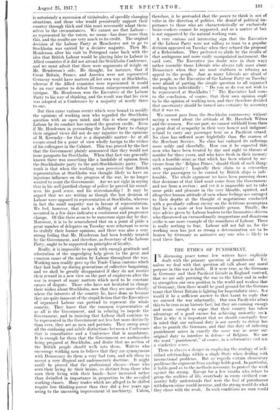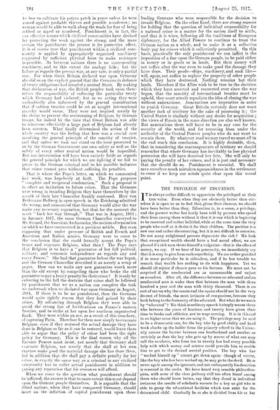THE ETHICS OF PUNISHMENT.
IN discussing peace terms few writers have explicitly 1. dealt with the primary question of punishment. Yet -unless we deal with that question all talk about our moral purpose in this war is futile. If it were true, as the Germans in Germany and their Pacificist friends in England contend,, that we are only pursuing the war to the bitter end in order to strengthen our own position in the world and weaken that of Germany, then there would be good ground for the German taunt that Great Britain is fighting for Imperialistic aitni. Nor would it be a sufficient answer to that taunt to reply that we entered the war reluctantly. Our own Pacifieists admit this to be true as an historic fact, but they are cunning enough and mean enough to argue that their country has taken advantage of a good excuse for achieving unworthy em's. That is why it is important that we should constantly bear in mind that our national duty is not merely to defeat but also to punish the Germans, and that this duty of inflicting punishment arises in exactly the same way as arose our original duty to interfere in defence of Belgium. We use the word " punishment," of course, in a reformative end nat a vindictive sense.
There is always a danger in employing the analogy of indi- vidual relationships within a single State when dealing with international problems. But as regards certain elementary problems the argument from analogy holds good. In particular. it holds good as to the methods necessary to protect the weak against the strong. Except for a few cranks who refuse to grasp the realities of life, everybody in every civilized com- munity fully understands that were the fear of punishment withdrawn crime would increase, and the strong would do what they chose with the weak. In such conditions no man would
le free to cultivate his potato patch in peace unless he were aimed against probable thieves and possible murderers; no woman would be able to walk along the roads for fear of being robbed or raped or murdered. Punishment is, in fact, the one effeetive means n hieh civilized communities have devised for protecting the weak against the strong, and the more certain the punishment the greater is its protective effect. It is of course true that punishment within a civilized com- munity is applied by appropriately organized machinery supported by sufficient physical force to make resistance impossible. As between nations there is no corresponding machinery, and to this extent the analogy fails ; but the failure as regards the present war, at any rate, is onlya partial one. For when Great Britain declared war upon Germany she did so on the explicit ground that the Germans in defiance of treaty obligations had invaded a neutral State. By making that declaration of war, the British peoples took upon them- selves the responsibility of enforcing the particular treaty which Germany had violated ; but in so acting they were undoubtedly also influenced by the general consideration that if solemn treaties could be set at naught international anarchy would ensue. They were not inspired merely by the desire to prevent the•overrunning of Belgium by German troops, for indeed by the time that Great Britain was able to intervene effectively a large part of Belgium had already been overrun. What finally determined the action of the whele country was the feeling that here was a crucial ease involving the general principle of the sanctity of treaties, and that unless we took our stand on the issue presented to us by the German Government our own safety as well as the safety of every other neutral nation would be imperilled.. But our intervention will have been entirely futile as regards the general principle for which we are fighting if we fail to prove to the German criminal and to his possible imitators that crime cannot pass without suffering its penalties.
That is where the Pope's letter, on which we commented hat week, was hopelessly at fault. The Pope proposes " complete and reciprocal condonation." Such a proposal is in effect an invitation to future crime. That the Germans were wrong in invading Belgium they have themselves by the mouth of their late Chancellor frankly confessed. Herr von Betlemann Hollweg in open speech in the Reichstag admitted the wrong, and announced that Germany would after the war make any necessary reparation, but that for the moment she must " hack her way through." That was in August, 1914 ; in January, 1917, the same German Chancellor conveyed to Mr. Gerard, the American Ambassador, the notions of reparation on which we have commented in a previous article. But even supposing that under pressure of British and French and American and Italian armies, Germany were to come to the conclusion that she could formally accept the Pope's terms and evacuate Belgium, what then ? The Pope says that Belgium is to have a "guarantee of her full political, military, and economic independence as regards any and every Power." She had that guarantee before the war began, and the German Chancellor described it as merely a scrap of paper. How can we make any new guarantee worth more than the old except by compelling those who broke the old guarantee to pay a heavy penalty for their crime ? It is only by enforcing to the full the doctrine that crime shall be followed by punishment that we as a nation can complete the task we undertook when we declared war upon Germany in August, 1914. If there is to be no punishment, then the Germans would quite rightly reason that they had gained by their crime. By advancing through Belgium they were able to avoid the strong line of fortifications on France's eastern: frontier, and to strike at her upon her northern unprotected flank. They were within an ace, as a result of this treachery, of capturing Paris. Therefore for them non- simply to evacuate Belgium, even if they restored the actual damage they have done in Belgium so far as it can be restored, would leave them able to argue that the policy of crime bad been the right policy for Germany. This is the final reason why all the Entente Powers must insist, not merely that Germany shall evacuate Belgium, not merely that she -shall at her own expense snake good the material damage-she has done there, but in addition that she shall pay a definite penalty for her crime, in exactly the same way as a criminal in any civilized community has to suffer actual punishment in addition to• paying any reparation that his resources will afford.
When we come to the question what .punishment should' be inflicted, the answer is that to sonic extent this must depend upon the German people themselves. It is arguable that the Allied nations, when they have conquered Germany, should! insist on the infliction of capital punishment upon those: leading Germans who were responsible for the decision to invade Belgium. On the other hand, there are strong reasons for holding that the question of individual responsibility for a national crime is a -matter for the nation itself to settle, and that it is wiser, following all the traditions of European diplomacy, for the Allied Powers to continue to treat the German nation as a whole, and to make it as a collective body pay for crimes Which it collectively permitted. On this basis, practically the only punishment we can inflict is the imposition of a tine upon the German people, to be paid either in money or in goods or in lands. But their money will not suffice after the war even to make good the damage they have done. Their goods—ships, maehinery,and such hike— will, again, not suffice to replace the property of other people which they have destroyed. Nothing remains but their lands. Therefore if the Allies wish to be true to the doctrine which they have asserted and reasserted ever since the war began, that the sanctity of international treaties -must bo upheld, they must utterly repudiate the idea of closing the war without annexations. Annexations are imperative in -order to punish Germany. Great Britain certainly does not want another inch of territory for the sake of possessing it ; the United States is similarly without any desire for acquisition ; the views of Russia in the same direction are also well known. But annexations there will have to be in any case for the security of the world, and for removing from under the authority of the Central Powers peoples who do not want to remain there. By whatever road we may travel we must all in the end reach this conclusion. It is highly desirable, then, that in considering the rearrangements of territory we should remember that where Germany has inevitably to lose physical possession she will have deserved her fate. She will only be paying the penalty of her crimes, and it is just and necessary that she should do so. Punishment is essential. We shall save ourselves much mistaken squeamishness in the settlement to come if we keep our minds quite clear upon this moral point.



























 Previous page
Previous page